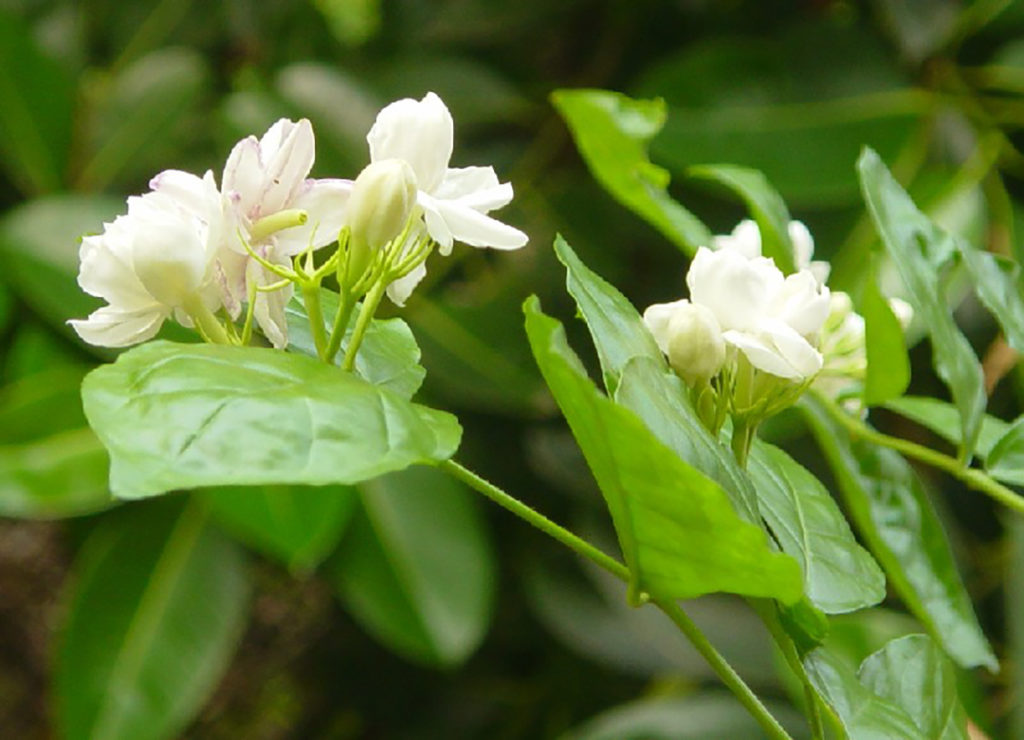
Djibouti
Jasmine
Jasminum

General Description / Cultural Significance
The people in Djibouti grow Jasmine and use it for its rich floral scent. When a happy event like the birth of a baby or a marriage occurs in this small and stable country, the mood-lifting scent of Jasmine is part of it. Men wear it in their hats and women use small needles to put the delicate white flowers on a string to wear in their hair.
Jasminum sambac, a sprawling shrub with glossy leaves and delicate flowers that open primarily at night, is commonly cultivated and used in Djibouti. Its flowers are used in perfumes and in scenting surroundings. In 2010 the African Journal of Plant Sciences published research that found that the essential oil and methanol extract from this plant had both antimicrobial and antioxidant activities, supporting the fact that traditional healers have used it to fight infections. The traditional use of the plant also suggests qualities such as antidepressant, anti-inflammatory, antiseptic, and aphrodisiac which scientists have confirmed.
Climate Change/Conservation Status
The annual precipitation is limited, there are no above ground rivers, and Lake Assai is the saltiest body of water in the world, which means that climate change is compounding water stress and desertification. Rising sea water is threatening aquifer salination, and is also causing coastal erosion.
Natural hazards such as extreme droughts, floods, and fires are increasing in frequency. Most of Djibouti’s rural population is susceptible to climate uncertainty, as their homes are in deserts that are often infertile. Food security is a problem. The country imports nearly all of its food, as agriculture is nearly impossible in most areas of the countries.
Both coastal protection and re-establishment of protected areas are ways in which the Djibouti government has attempted to respond to climate issues in the past decade. The country also seeks to establish long-term sustainable economic development.
The country is experiencing extremely high temperature spikes, especially during the summer hot season. Despite these temperature extremes, there are no reports of jasmine’s endangerment.
Alternate Names
Poet’s Jasmine
Arabian Jasmine
Sources
Climate Change Knowledge Portal, 2019. Djibouti. World Bank Group. [website]
Cutbill, C.C., & Schraeder, P.J., 2021. Djibouti. Encyclopedia Britannica. [website]
Hassan-Abdallah, A., et. al., 2013. Medicinal plants and their uses by the people in the Region of Randa, Djibouti. Journal of Ethnopharmacology, 148(2), pp. 701-713. [website] DOI: 10.1016/j.jep.2013.05.033
Mission of the Republic of Djibouti to the United Nations. This statement can be found on the World Sensorium original website.
Schulman, S., 2019. Shortages of food, water and electricity: how Djibouti has been destroyed by climate change. The Telegraph. [website]
Troni, J., 2018. Oasis dreaming: regreening the Djiboutian Desert. UNEP. [website]

